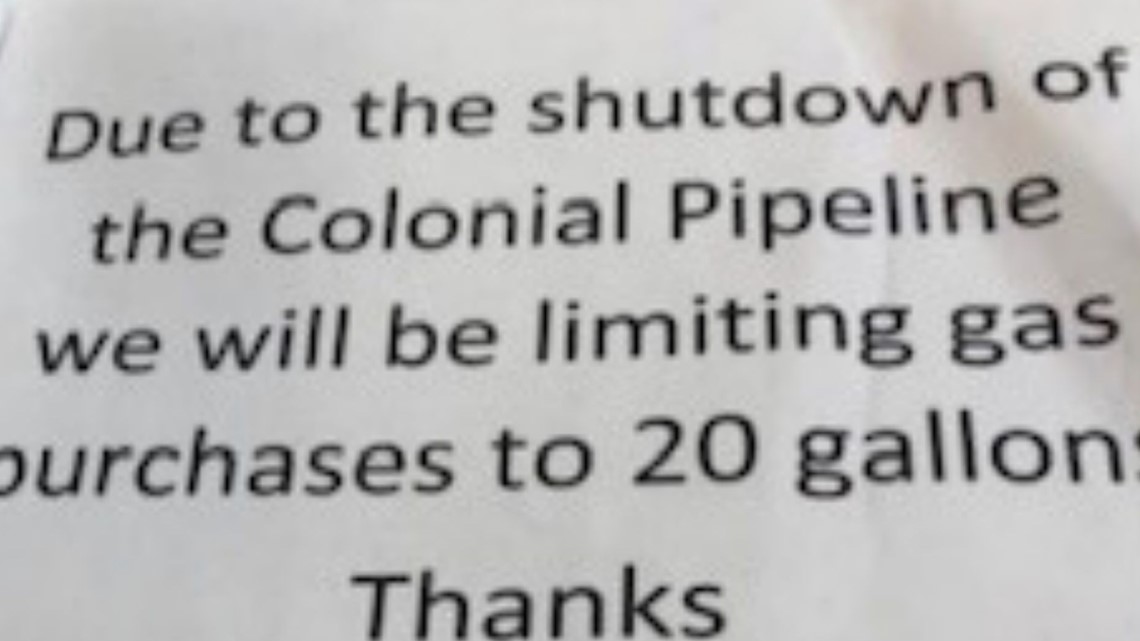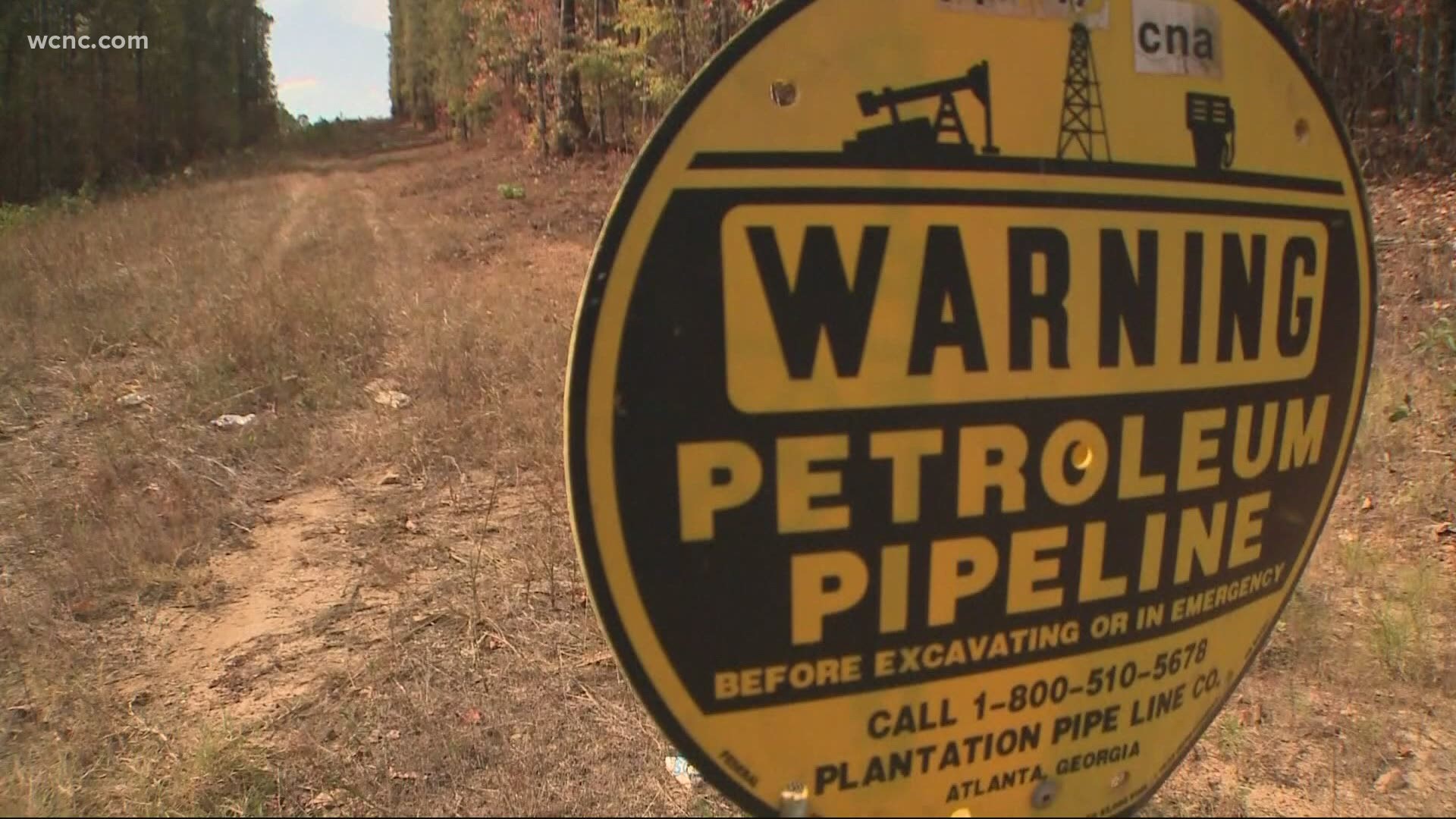CHARLOTTE, N.C. — The Colonial Pipeline, which cuts through the Charlotte area and is one of the nation's largest sources of fuel, remains mostly shut down after a cyberattack.
Experts say this could have major impacts on summer travel in the Carolinas. The Colonial Pipeline runs from Texas to New Jersey, carrying more than 100 million barrels of fuel every day. That's everything from gasoline to heating oil and jet fuel that supplies Charlotte Douglas International Airport.
It's responsible for almost half of the entire East Coast's fuel supply. So what does the shutdown mean?
For starters, experts say you can expect to pay more at the pump as rising gas prices are a real concern. Any time there's a supply issue, prices are likely to surge, and with more Americans getting their COVID-19 vaccination and making summer travel plans, it's only going to increase demand.
The average U.S. price of regular-grade gasoline has jumped 6 cents over the past two weeks, to $3.02 per gallon, which is $1.05 higher than it was a year ago.
Charlotte also already seeing gas prices ticking up. According to a GasBuddy survey of more than 660 gas stations, prices at the pump have risen more than 6 cents, averaging $2.70/gallon -- 6.9 cents per gallon higher than a month ago and stand 98.7 cents per gallon higher than a year ago.
WCNC Charlotte is seeking solutions by finding a resource for residents who don't want to drive all around town, trying to find which stations have gas and which don't. If you absolutely need to get gas, try using this Gas Buddy Tracker to find out where the shortages are. Just search for your zip code and it will list which stations have fuel.
Those year-ago numbers are skewed somewhat because the nation was going into lockdown due to the pandemic.
Analysts say the impact all comes down to timing and how quickly Colonial Pipeline can get their lines back up and running.
Based on his analysis, Roger Read, a Senior Energy Analyst for Wells Fargo says if the pipeline is at least partially restarted by Wednesday, he expects there will not be any significant or lasting impacts.
In response to the temporary shutdown of the Colonial Pipeline, Governor Roy Cooper today signed an Executive Order declaring a state of emergency in North Carolina and temporarily suspending motor vehicle fuel regulations to ensure adequate fuel supply supplies throughout the state.
“Today’s emergency declaration will help North Carolina prepare for any potential motor vehicle fuel supply interruptions across the state and ensure motorists are able to have access to fuel,” Governor Cooper said.
In an update Monday, Colonial said, "Colonial Pipeline is continuing to work in partnership with third-party cybersecurity experts, law enforcement, and other federal agencies to restore pipeline operations quickly and safely. While this situation remains fluid and continues to evolve, the Colonial operations team is executing a plan that involves an incremental process that will facilitate a return to service in a phased approach."
We can now report that Line 4, which runs from Greensboro, N.C., to Woodbine, Md., is operating under manual control for a limited period of time while existing inventory is available. As previously announced, while our main lines continue to be offline, some smaller lateral lines between terminals and delivery points are now operational as well. We continue to evaluate product inventory in storage tanks at our facilities and others along our system and are working with our shippers to move this product to terminals for local delivery.
Our primary focus remains the safe and efficient restoration of service to our pipeline system, while minimizing disruption to our customers and all those who rely on Colonial Pipeline. We will continue to provide updates as restoration efforts progress.
As of Monday, the pipeline had been closed for 4 days.
"As you go beyond five days, even sort of normal buying pressure or normal buying volumes would tend to deplete the stocks that are available," said Read, who said in addition to a spike in gas prices, said we could also see shortages.
"The more inland you are the more likely you are to have a shortage issue," he said, adding that "If you think about the distance from Charlotte to the coastline, Atlanta to the coastline -- Nashville is another major city that gets its product from Colonial -- it's quite a distance to bring that up and there are no existing pipelines from the coastlines to go into those cities, because again, Colonial is your main source."
He says the biggest impact would come if the pipeline were to stay closed for longer than 10 days.
"Beyond 10 days you run into the issue of, you probably depleted all available local fuel stocks, you would then have a restocking period required on top of just matching current demand and you'd probably, unfortunately, have situations where certain types of very fuel-dependent businesses in the transportation…think buses, think airplanes, things like that, would probably have to curtail operations," he said.
On Monday, the FBI confirmed the Darkside ransomware was responsible for the cyberattack. In a tweet, the FBI said it will continue to work with Colonial Pipeline and government partners on the investigation.
RELATED: Experts say drivers can continue filling up at the gas station amid fuel delivery driver shortage
Officials are now urging Americans to show patience and avoid panic buying at the pump, as that will only make things worse in the short term.
"If people decide that they're fearful and they all go fill up their gas tanks, which is probably happening, then you can have some spot shortages locally," said Read.
Monday, AAA of the Carolina's sent WCNC a photo taken at a Corner Pantry gas station in South Carolina, which cited the pipeline and said it was limiting customers to 20 gallons, per purchase.


WCNC Charlotte's Bill McGinty took photos at a gas station in Cullowhee, North Carolina, and in Waxhaw, North Carolina. In one photo, several cars can be seen lined up to get gas at an Exxon station in Cullowhee.
QuikTrip issued the following statement to WCNC Charlotte Monday:
"QuikTrip is taking all necessary precautions based on what we know. We currently have adequate supply for normal demand."
In response to the attack, the Biden administration loosened regulations for the transport of petroleum products on highways as part of an "all-hands-on-deck" effort to avoid disruptions in the fuel supply.
"The nice thing here -- the important thing -- is there are no reports of any physical damage to the system so as they’re comfortable about the computer systems working we should be up and running and back to normal," said Read.
Contact Ben Thompson at bthompson@wcnc.com and follow him on Facebook, Twitter and Instagram.
Wake Up Charlotte To Go is a daily news and weather podcast you can listen to so you can start your day with the team at Wake Up Charlotte.
SUBSCRIBE: Apple Podcasts || Spotify || Stitcher || TuneIn || Google Podcasts
All of WCNC Charlotte's podcasts are free and available for both streaming and download. You can listen now on Android, iPhone, Amazon, and other internet-connected devices. Join us from North Carolina, South Carolina, or on the go anywhere.


